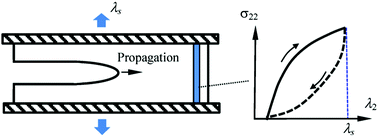Fracture toughness of hydrogels: measurement and interpretation
Abstract
The fracture mechanics of hydrogels, especially those with significantly enhanced toughness, has attracted extensive research interests. In this article we discuss the experimental measurement and theoretical interpretation of the fracture toughness for soft hydrogels. We first review the definition of fracture toughness for elastic materials, and the commonly used experimental configurations to measure it. In reality most gels are inelastic. For gels that are rate insensitive, we discuss how to interpret the fracture toughness associated with two distinct scenarios: crack initiation and steady-state crack propagation. A formulation to estimate energy dissipation during steady-state crack propagation is developed, and connections to previous models in the literature are made. For gels with rate-dependent behaviors, we review the physical mechanisms responsible for the rate-dependence, and outline the difficulties to rigorously define the fracture toughness for both crack initiation and propagation. We conclude by discussing a few fundamental questions on the fracture of tough gels that are yet to be answered.


 Please wait while we load your content...
Please wait while we load your content...